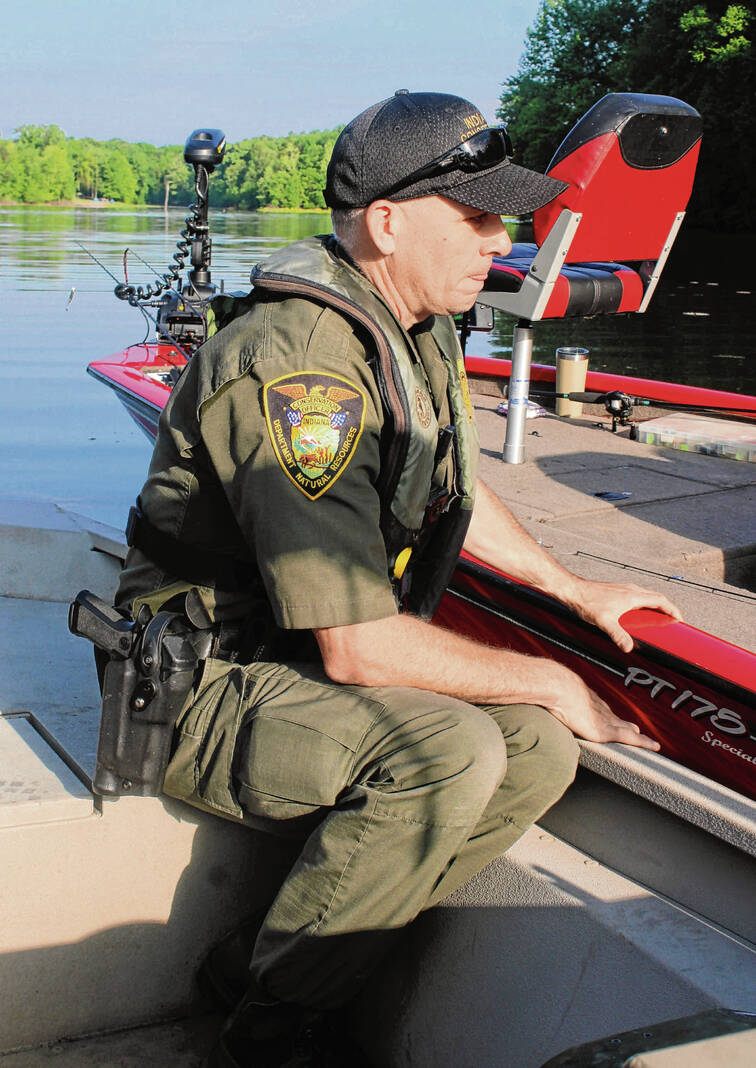
Indiana Conservation Officer Rob Klakamp on fish patrol at Hardy Lake near Austin.
Lew Freedman | The Tribune
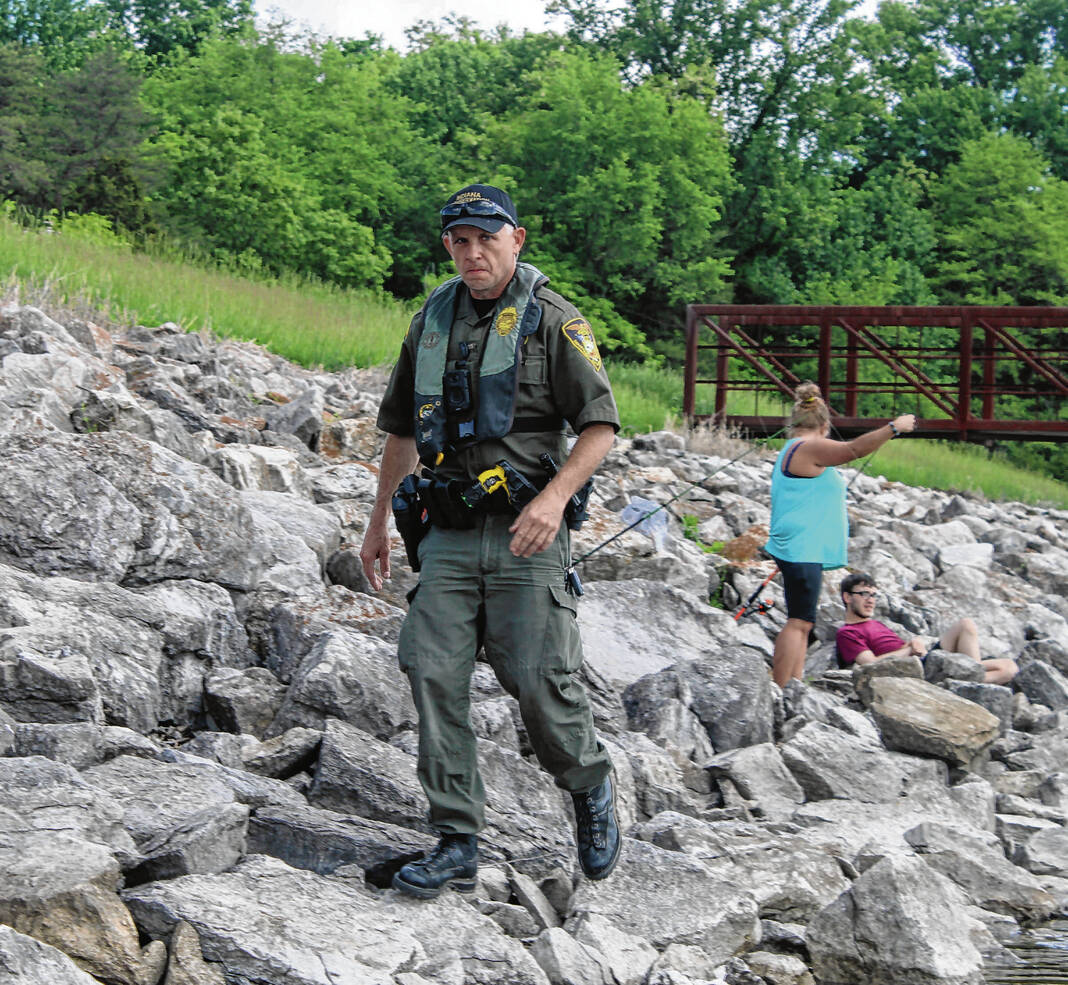
Sometimes on his patrol, Indiana Conservation Officer Rob Klakamp parked his boat and checked fishing licenses of those fishing onshore.
Lew Freedman | The Tribune
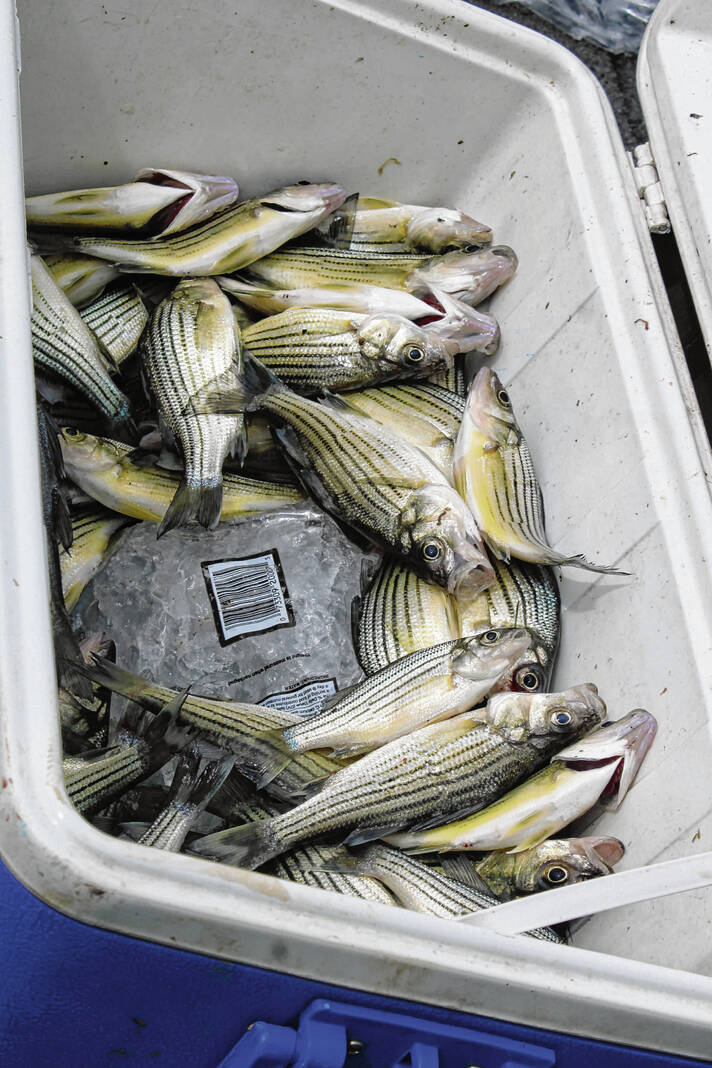
Two anglers caught 130 yellow bass on Hardy Lake in one morning.
Lew Freedman | The Tribune
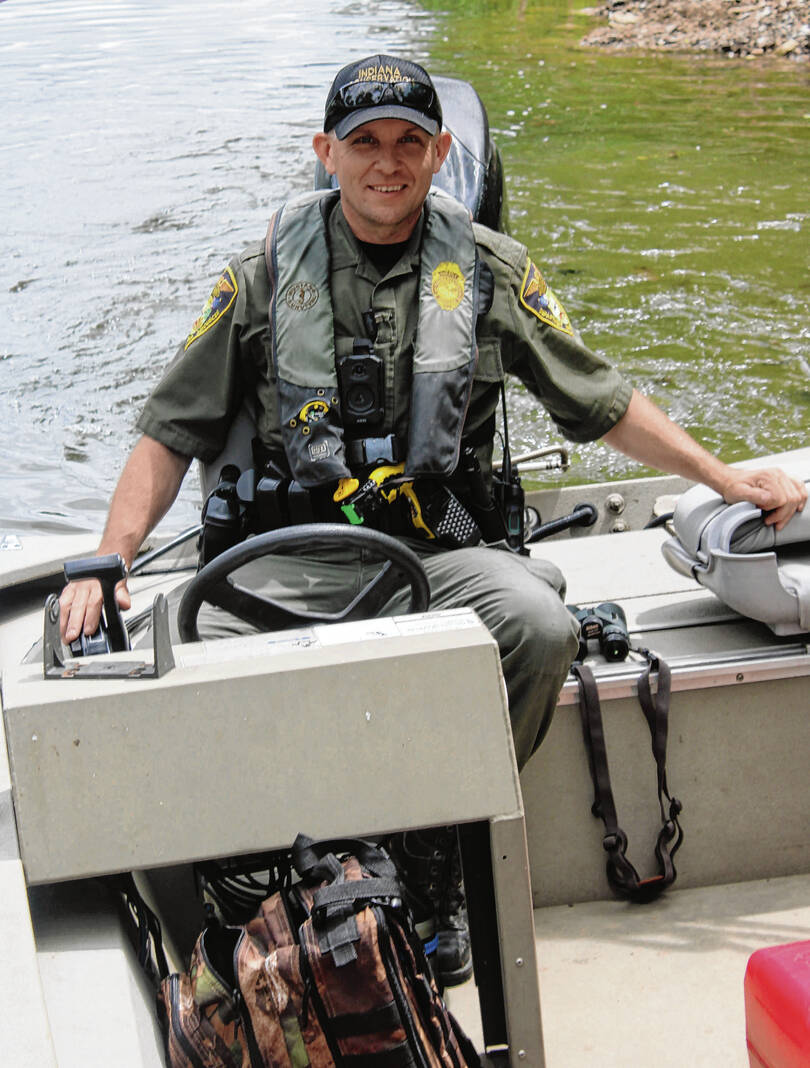
Indiana Conservation Officer Rob Klakamp at wheel of his DNR 16-foot patrol boat on Hardy Lake near Austin.
Lew Freedman | The Tribune
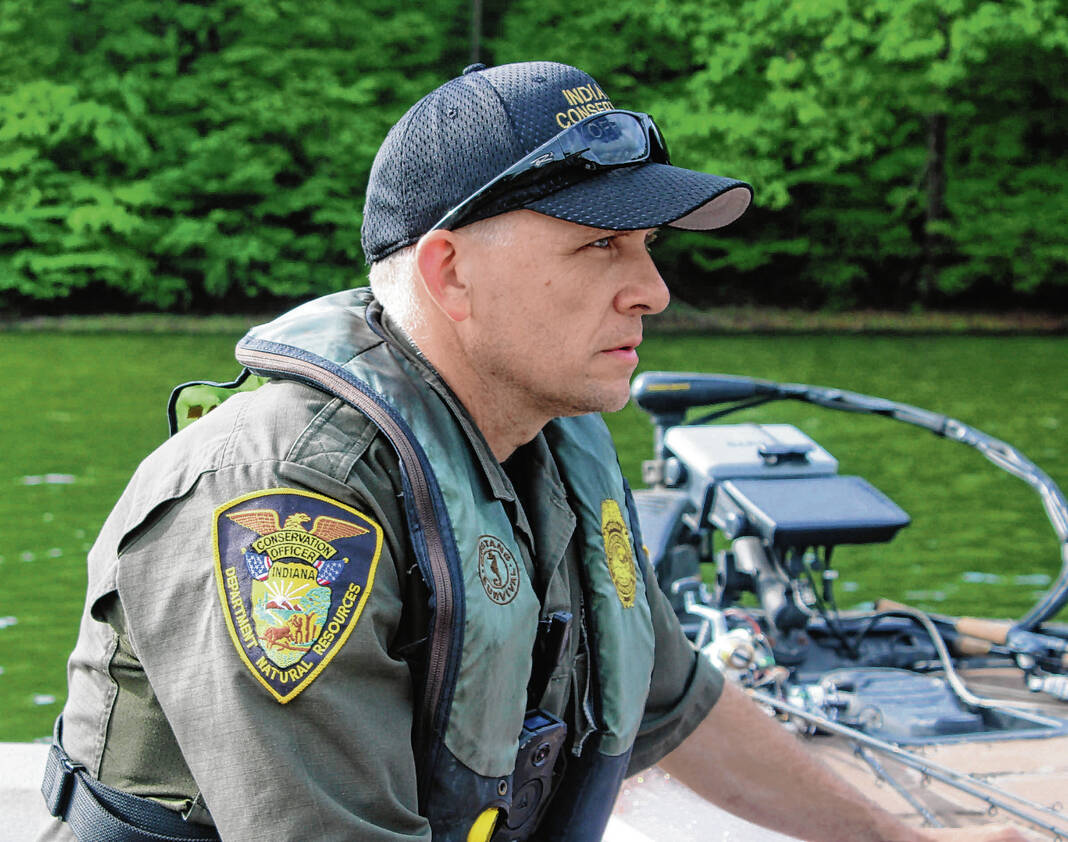
Indiana Conservation Officer Rob Klakamp can be seen patrolling Hardy Lake six times in a month checking on fish law compliance.
Lew Freedman | The Tribune
AUSTIN — Rob Klakamp spent his sunny Sunday morning going door-to-door circling 741-acre Hardy Lake, making a house call at every fishing boat on the water.
He was not selling any political candidate, or God, but he was checking on Indiana state Department of Natural Resources gospel, ensuring angler participants at Hardy Lake State Park were following fishing rules.
For nearly five hours on the pure 75-degree day, the Jackson County conservation officer motored in a 16-foot boat from spot-to-spot, including to shore, checking fishing licenses and life jackets and in some cases measuring catch sizes and limits.
Identified easily by his full green uniform, with the word “police” across his back and with a handgun on his hip and featuring a conservation patch on his clothing, Klakamp looked as official as is possible as he approached anglers wearing T-shirts and shorts. While the DNR boat itself did not splash people with flashing lights, it was prominently labeled.
It was no secret who was pulling up alongside a paused fishing boat when Klakamp appeared and asked that all adults aboard produce valid fishing licenses, hold up life jackets, and show a float cushion as a backup rescue device.
This is a regular aspect of a conservation officer’s duties and Klakamp regularly patrols Lake John Hay, Lake Salinda and Delaney Creek Park all in the Salem area and Deam Lake State Recreation Area, but was scheduled for six visits in a month at Hardy Lake.
“This is the biggest body of water in this district,” Klakamp said.
Where there is water, there is fish, and where there are fish, there are fishermen, who it is hoped are following rules and regulations and staying safe while boating.
Klakamp’s encounters with those fishing in the sunshine as they rotated their boats to favorite lake spots generally could be said to differ in tone from those of police officers making traffic stops on the highway.
While business was transacted, digging out licenses, pulling life jackets from their enclosures, banter on the frequency of the fishing bite occurred. Some anglers sought updated reports from Klakamp.
The officer said such conversation is common.
“Most are welcoming,” Klakamp said of his reception.
Two anglers, possibly senior citizens, who said they were fishing for bass, but facing a slow bite, illustrated that. “Let me get my old-man license out,” said one, apparently referring to an Indiana senior-citizen license. “I want to thank you for what you do.”
That implied a belief in the system by which anglers pay to fish and support Fish and Game funding while also managing the resources in state waters.
However, the other man, using the alias “Steve,” recounted how once on Patoka Lake he had 11 fish in a live well and one turned out to be 1/8 th of an inch shy of the nine-inch minimum length required.
“Cost me $140 and BS,” “Steve” said.
As if to suggest Klakamp should not take this tale personally, his partner “Cletus,” said, “99.9 percent of game wardens are good to deal with.”
As Klakamp pulled away from the duo, he said, “99 percent of the sportsmen are just out here having a good time. We’re just keeping them honest.”
Klakamp listened to and chatted with anglers, noting sometimes a stop takes two minutes and other times it takes 10 minutes.
“I’ll talk as long as they want to,” he said.
One thing the average non-boating angler might not think of is that under Indiana law, in addition to life jackets, a float cushion must be carried on any boat 16 feet or larger.
Klakamp said a simple float cushion can be a life saver. If someone falls overboard, it may be easier to toss a cushion than it would be to throw a life jacket.
Klakamp paused at a boat with a middle-aged couple. As the male sought to show the needed equipment, she fished. Her personal style is to go barefoot on the boat at all times, she said. That includes on days much colder than this one.
“That’s just my fishing,” she said, noting she had been visiting Hardy Lake for years, going back to aged five with her parents.
Meanwhile, her partner searched compartments for a throw cushion, coming up empty. Klakamp took his driver’s license and employing a communications device perched on his chest, contacted a Paynetown DNR office at Monroe Lake in Bloomington.
Assisting an officer in the field, the dispatcher checked to see if there were outstanding warrants on the individual. There were not. Klakamp wrote up a warning for the float cushion violation, but light-heartedly informed the man it was “just a souvenir” of the occasion.
Not all such field checks are so uneventful. Blake Everhart, another Jackson County conservation officer, who like Klakamp spends considerable time patrolling area waters, said sometimes he will be informed there is a warrant on a person and sometimes a boat stoppage results in a criminal situation with perhaps drugs involved.
“Not every stop is the same every day,” said Everhart, who also patrols Hardy Lake, as well as the White River and the Muscatatuck River. He regularly stops to check public access sites. Driving past, “I am going to at least pull in.”
Hardy Lake attracts many visitors from Louisville, so close to the state line with Kentucky, or Southern Indiana residents from New Albany. The rivers, Everhart said, are fished routinely by many people who live along them.
“Most people are squared away,” he said. “But we do run into our share of people who are up to no good.”
A few weeks ago, Everhart approached a large group of people fishing at the Rockford Dam and when he checked, three did not have fishing licenses.
When patrolling, Everhart said he watches anglers from a distance through binoculars, documenting whether they are actually fishing or not.
“Just to make sure,” he said before asking for licenses. If they see him coming, they can throw down rods and say, “Oh, I’m not fishing.” But he will already know the right answer.
Nothing resembling that happened on Klakamp’s watch at Hardy Lake on his recent patrol. He recognized several fishing groups from past encounters.
Klakamp chatted with a couple and their six-year-old grandson on an outing – they were in all-around compliance. One regular, accompanied by an out-of-state friend – they both had proper licenses – told of catching somewhat remarkable fish on Hardy Lake. One was a 30-inch walleye and one a 20-inch crappie. Perhaps thinking Klakamp wondered if was telling tall tales, he whipped out his cell phone and showed proof-positive photos.
Another grandfather with a high-school aged grandson were after crappie. The limit is 25, and be at least nine inches long. They had about a half-dozen in a live well. Typically, during a check, Klakamp will pluck out the smallest one and measure it.
This time when he slipped the fish into a measuring sleeve it came in at 8 7/8 inches, even when pressing down on the tail. That led him to measure all of the others. They were all legal.
“I think you’re trying to do it right,” Klakamp said. He released the short one back into the lake and wrote out a warning slip. “Just be a little bit more careful.”
Two older regulars, Donald and Bernie, love fishing for yellow bass. Certain fish have state-set limits and cannot be kept unless of a certain size. It’s wide open on yellow bass at Hardy Lake and the anglers had been enjoying the morning for hours. They had 130 few-inch-long fish in a cooler packed with ice. A high-speed calculator might have helped keep track of the haul.
To those guys, yellow bass are the best-eating fish around. If others did not agree, that was their loss.
Motoring from one shore of Hardy Lake to another, Klakamp checked 16 boats and 33 anglers. The morning’s tally resulted in just two warning violations written, one for the short crappie, one for the missing throw cushion. Everyone had a valid fishing license. No bad guys with warrants.
It was a fairly routine, slow day on the lake. Just the way DNR likes it.
